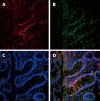Phytoestrogens/insoluble fibers and colonic estrogen receptor β: randomized, double-blind, placebo-controlled study
- PMID: 23885143
- PMCID: PMC3718900
- DOI: 10.3748/wjg.v19.i27.4325
Phytoestrogens/insoluble fibers and colonic estrogen receptor β: randomized, double-blind, placebo-controlled study
Abstract
Aim: To assess the safety and effect of the supplementation of a patented blend of dietary phytoestrogens and insoluble fibers on estrogen receptor (ER)-β and biological parameters in sporadic colonic adenomas.
Methods: A randomized, double-blind placebo-controlled trial was performed. Patients scheduled to undergo surveillance colonoscopy for previous sporadic colonic adenomas were identified, and 60 eligible patients were randomized to placebo or active dietary intervention (ADI) twice a day, for 60 d before surveillance colonoscopy. ADI was a mixture of 175 mg milk thistle extract, 20 mg secoisolariciresinol and 750 mg oat fiber extract. ER-β and ER-α expression, apoptosis and proliferation (Ki-67 LI) were assessed in colon samples.
Results: No adverse event related to ADI was recorded. ADI administration showed a significant increases in ER-β protein (0.822 ± 0.08 vs 0.768 ± 0.10, P = 0.04) and a general trend to an increase in ER-β LI (39.222 ± 2.69 vs 37.708 ± 5.31, P = 0.06), ER-β/ER-α LI ratio (6.564 ± 10.04 vs 2.437 ± 1.53, P = 0.06), terminal deoxynucleotidyl transferase-mediated dUTP nick end labeling (35.592 ± 14.97 vs 31.541 ± 11.54, P = 0.07) and Ki-67 (53.923 ± 20.91 vs 44.833 ± 10.38, P = 0.07) approximating statistical significance. A significant increase of ER-β protein (0.805 ± 0.13 vs 0.773 ± 0.13, P = 0.04), mRNA (2.278 ± 1.19 vs 1.105 ± 1.07, P < 0.02) and LI (47.533 ± 15.47 vs 34.875 ± 16.67, P < 0.05) and a decrease of ER-α protein (0.423 ± 0.06 vs 0.532 ± 0.11, P < 0.02) as well as a trend to increase of ER-β/ER-α protein in ADI vs placebo group were observed in patients without polyps (1.734 ± 0.20 vs 1.571 ± 0.42, P = 0.07).
Conclusion: The role of ER-β on the control of apoptosis, and its amenability to dietary intervention, are supported in our study.
Keywords: Estrogen receptor-α; Estrogen receptor-β; Insoluble fibers; Phytoestrogens; Sporadic adenomatous polyposis; Terminal deoxynucleotidyl transferase-mediated dUTP nick end labeling.
Figures


Similar articles
-
Supplementation with phytoestrogens and insoluble fibers reduces intestinal carcinogenesis and restores ER-β expression in Apc-driven colorectal carcinogenesis.Eur J Cancer Prev. 2020 Jan;29(1):27-35. doi: 10.1097/CEJ.0000000000000542. Eur J Cancer Prev. 2020. PMID: 31651566
-
The sharp decline of beta estrogen receptors expression in long-lasting ulcerative-associated carcinoma.Scand J Gastroenterol. 2015 Aug;50(8):1002-10. doi: 10.3109/00365521.2014.978817. Epub 2015 Apr 10. Scand J Gastroenterol. 2015. PMID: 25862314
-
Estrogen Receptor β as a Prognostic Marker of Tumor Progression in Colorectal Cancer with Familial Adenomatous Polyposis and Sporadic Polyps.Pathol Oncol Res. 2018 Jul;24(3):533-540. doi: 10.1007/s12253-017-0268-5. Epub 2017 Jul 5. Pathol Oncol Res. 2018. PMID: 28681123
-
Estrogen in obesity-associated colon cancer: friend or foe? Protecting postmenopausal women but promoting late-stage colon cancer.Cancer Causes Control. 2012 Nov;23(11):1767-73. doi: 10.1007/s10552-012-0066-z. Epub 2012 Sep 26. Cancer Causes Control. 2012. PMID: 23011535 Review.
-
The Efficacy of Split-Dose Bowel Preparations for Polyp Detection: A Systematic Review and Meta-Analysis.Am J Gastroenterol. 2019 Jun;114(6):884-892. doi: 10.14309/ajg.0000000000000155. Am J Gastroenterol. 2019. PMID: 30865011
Cited by
-
Stool Investigations for Colorectal Cancer Screening: From Occult Blood Test to DNA Analysis.J Gastrointest Cancer. 2016 Jun;47(2):143-51. doi: 10.1007/s12029-016-9810-z. J Gastrointest Cancer. 2016. PMID: 26922358
-
Phytoestrogens: Dietary Intake, Bioavailability, and Protective Mechanisms against Colorectal Neoproliferative Lesions.Nutrients. 2019 Jul 24;11(8):1709. doi: 10.3390/nu11081709. Nutrients. 2019. PMID: 31344966 Free PMC article. Review.
-
Curcumin and Colorectal Cancer: From Basic to Clinical Evidences.Int J Mol Sci. 2020 Mar 29;21(7):2364. doi: 10.3390/ijms21072364. Int J Mol Sci. 2020. PMID: 32235371 Free PMC article. Review.
-
Epithelial turnover in duodenal familial adenomatous polyposis: A possible role for estrogen receptors?World J Gastroenterol. 2016 Mar 21;22(11):3202-11. doi: 10.3748/wjg.v22.i11.3202. World J Gastroenterol. 2016. PMID: 27003997 Free PMC article.
-
Chemoprevention of Colorectal Cancer by Dietary Compounds.Int J Mol Sci. 2018 Nov 28;19(12):3787. doi: 10.3390/ijms19123787. Int J Mol Sci. 2018. PMID: 30487390 Free PMC article. Review.
References
-
- Koo JH, Leong RW. Sex differences in epidemiological, clinical and pathological characteristics of colorectal cancer. J Gastroenterol Hepatol. 2010;25:33–42. - PubMed
-
- Woodson K, Lanza E, Tangrea JA, Albert PS, Slattery M, Pinsky J, Caan B, Paskett E, Iber F, Kikendall JW, et al. Hormone replacement therapy and colorectal adenoma recurrence among women in the Polyp Prevention Trial. J Natl Cancer Inst. 2001;93:1799–1805. - PubMed
-
- Solimando R, Bazzoli F, Ricciardiello L. Chemoprevention of colorectal cancer: a role for ursodeoxycholic acid, folate and hormone replacement treatment. Best Pract Res Clin Gastroenterol. 2011;25:555–568. - PubMed
-
- Chang EC, Frasor J, Komm B, Katzenellenbogen BS. Impact of estrogen receptor beta on gene networks regulated by estrogen receptor alpha in breast cancer cells. Endocrinology. 2006;147:4831–4842. - PubMed
Publication types
MeSH terms
Substances
LinkOut - more resources
Full Text Sources
Other Literature Sources
Medical

